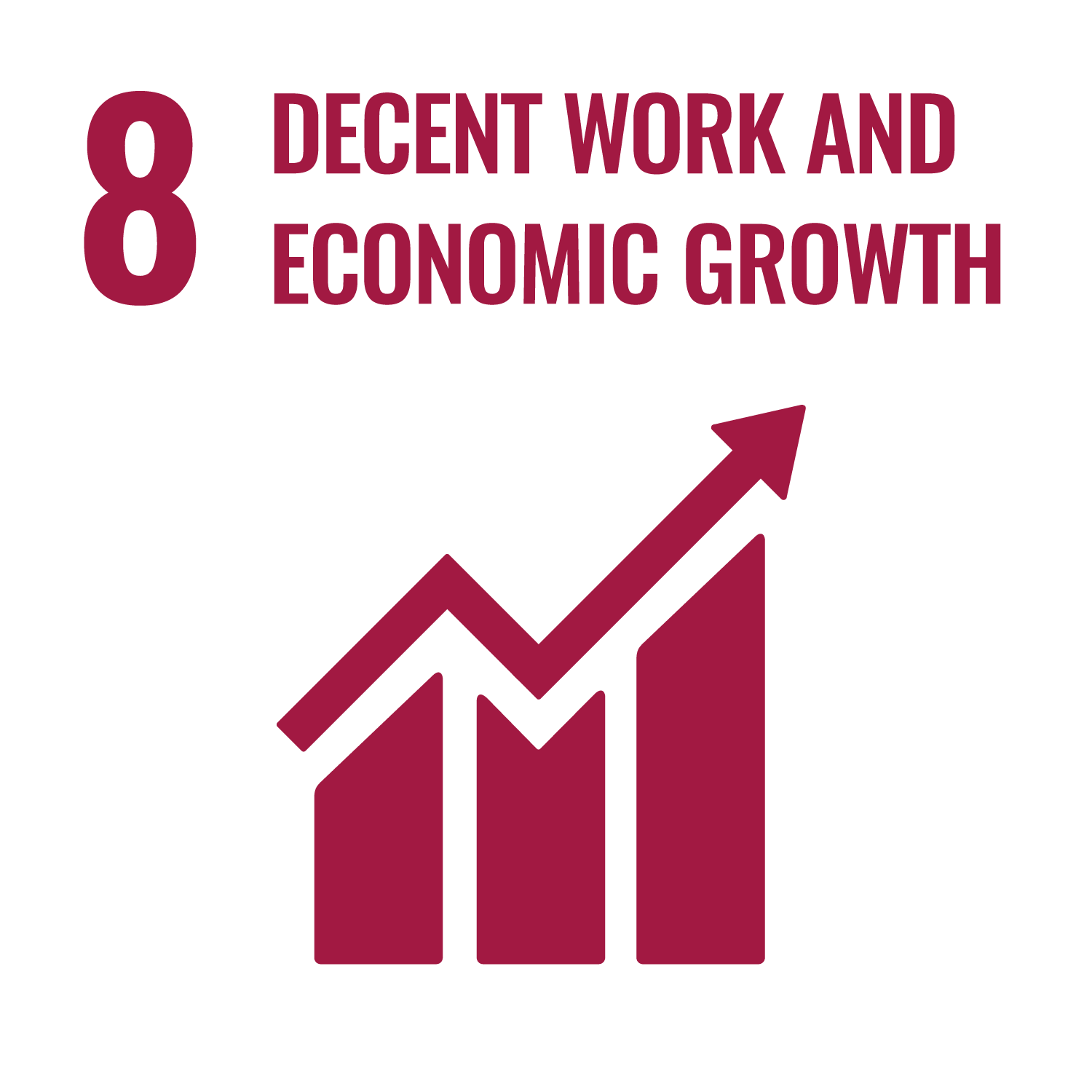 Goal 8. Decent Work and Economic Growth
Goal 8. Decent Work and Economic Growth
8.2.1 Employment practice living wage
2023-2024
The Arab Academy for Science, Technology, and Maritime Transport (AASTMT) demonstrates a steadfast commitment to Sustainable Development Goal 8 (Decent Work and Economic Growth) by ensuring that its labor market practices foster fairness, inclusivity, and long-term economic development. Through the provision of competitive and equitable wages, the Academy recognizes that human capital investment is central not only to financial well-being but also to social justice and sustainable development.
By aligning employee compensation with individual skills, productivity, and contributions, AASTMT enhances labor productivity, stimulates employment growth, and strengthens labour relations within a safe and supportive working environment. This focus on occupational safety, decent employment, and job creation contributes to a more resilient and productive labor force, supporting broader regional development and economic growth.
Furthermore, the Academy’s approach reflects modern development policy principles—linking fair labor practices to technological progress, eco-efficiency, and sustainable economic performance. Through its policies, AASTMT emerges as a forward-thinking institution that not only supports financial literacy and worker well-being but also integrates environmental and economic sustainability into its institutional framework—embodying the spirit of SDG 8 and contributing to inclusive, equitable, and sustainable growth.
Pay Scale Equity Employment Policy at AASTMT
In alignment with Sustainable Development Goal 8 (Decent Work and Economic Growth), the Arab Academy for Science, Technology, and Maritime Transport (AASTMT) demonstrates a strong institutional commitment to labor equity, human capital development, and sustainable economic growth. The Academy ensures that all faculty, staff, and workers receive salaries that exceed the local living wage and the government-mandated minimum wage, thereby fostering job security, social inclusion, and economic well-being across its workforce.
Recognizing its employees as a vital source of human capital and a driver of total factor productivity growth, AASTMT has established the Pay Scale Equity Employment Policy—a cornerstone of its development policy and industrial relations framework. This policy upholds the principles of equal employment opportunity as outlined in Article 35 of the Egyptian Labor Law, ensuring fairness, transparency, and equality in compensation and treatment for all employees, regardless of position or background.
By prioritizing fair wages, safe working environments, and equal labor opportunities, AASTMT promotes labor productivity, decent employment, and sustainable regional development. Its approach reflects a comprehensive understanding of the link between economic and social sustainability, technological change, and human resource empowerment—positioning the Academy as a leader in advancing inclusive economic growth, occupational equity, and sustainable development within Egypt’s labor market.
Please read our Pay Scale Equity Employment Policy at the following link:
Pay Scale Equity Employment Policy at AASTMT on AASTMT webpage
Moreover, the Arab Academy for Science, Technology, and Maritime Transport (AASTMT) has organized several workshops aimed at raising awareness among faculty, staff, and other stakeholders about the importance of fostering a decent and equitable workplace, emphasizing fair compensation and the payment of just wages.
MARLOG 2024 International Conference Promotes Decent Work Practices and Fair wages in the Maritime and Logistics sector
Alexandria, Egypt – March 2024 — The Arab Academy for Science, Technology and Maritime Transport (AASTMT) successfully hosted the 13th International Maritime Transport and Logistics Conference (MARLOG 2024) under the theme “Sustainable and Resilient Infrastructure in Ports and Logistics.” The conference brought together global experts, policymakers, academics, and industry leaders to discuss the latest trends shaping the maritime and logistics sectors.
Aligned with the United Nations Sustainable Development Goal 8 (Decent Work and Economic Growth), MARLOG 2024 underscored the AASTMT’s unwavering commitment to promoting fair employment practices, pay scale equity, and decent working conditions within the maritime and logistics industries. The conference highlighted how sustainability and economic growth must go hand-in-hand with equitable and ethical employment systems that ensure fair treatment and compensation for all workers.
AASTMT President, H.E. Prof. Dr. Ismail Abdel Ghaffar Ismail Farag, emphasized during the conference that sustainable development in the maritime sector cannot be achieved without prioritizing human capital. The Academy’s Pay Scale Equity Employment Policy, rooted in Article 35 of the Egyptian Labor Law, guarantees equal pay for equal work and promotes a living wage that exceeds national minimum wage standards. This policy reflects AASTMT’s belief that its people are its greatest asset and that decent working conditions are central to institutional excellence and long-term economic growth.
Through its ongoing initiatives, AASTMT ensures that all faculty, staff, and workers receive fair salaries and benefits that support a dignified standard of living. The institution continuously reviews its employment practices to maintain wage equity and eliminate discrimination, while offering professional development programs that enhance job stability and employee satisfaction.
By linking the conference’s theme of “resilient and sustainable infrastructure” with the broader social dimension of decent work and fair pay, MARLOG 2024 reinforced AASTMT’s leadership role in integrating sustainability across both its academic mission and its employment culture. The event also showcased how investing in human capital within logistics and port management directly contributes to productivity, innovation, and inclusive economic growth — the very essence of SDG 8.
AASTMT continues to champion sustainability not only through academic excellence and technological innovation but also through fair labor practices that empower its workforce and advance the global agenda for decent work and equitable growth.
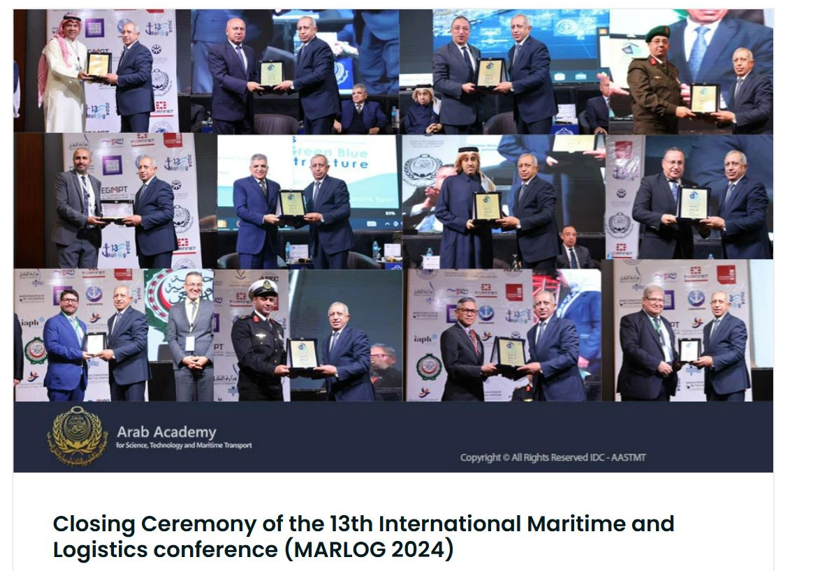
For more information:
Visit MARLOG 2024 International Conference Promotes Decent Work Practices and Fair wages in the Maritime and Logistics sector on AASTMT webpage
AASTMT Hosts Press Conference for the 36th International Olympiad in Informatics (IOI 2024) — Empowering Youth and Advancing Decent Work and Economic Growth
Alexandria, Egypt — The Arab Academy for Science, Technology and Maritime Transport (AASTMT) reaffirmed its commitment to the United Nations Sustainable Development Goal 8 (SDG 8): Decent Work and Economic Growth through hosting a major press conference announcing Egypt’s hosting of the 36th International Olympiad in Informatics (IOI 2024).
The press conference, held on Sunday 25 February 2024 at AASTMT’s Abu Qir Campus, was attended by H.E. Dr. Ashraf Sobhy, Minister of Youth and Sports, H.E. Major General Mohamed El-Sherif, Governor of Alexandria, and Prof. Ismail Abdel Ghafar Ismail Farag, President of AASTMT, along with representatives from the International Olympiad in Informatics (International Committee IOI).
By hosting IOI 2024, AASTMT continues to invest in youth capacity building, digital skills development, and innovation-driven employment, directly contributing to SDG 8’s targets of productive employment and sustainable economic growth. The Olympiad provides students with the opportunity to enhance their programming, problem-solving, and teamwork skills — all of which are vital for future job markets shaped by digital transformation and the knowledge economy.
Through initiatives such as IOI 2024, AASTMT not only supports academic excellence but also promotes decent work readiness by bridging the gap between education and industry. The event inspires young talents to pursue careers in technology, data science, and innovation, thereby fostering inclusive growth and the creation of high-quality, future-oriented jobs.
“AASTMT believes that empowering youth with digital competencies is key to building resilient economies and ensuring decent work opportunities for all,” said Prof. Ismail Abdel Ghafar Ismail Farag, President of AASTMT. “Hosting IOI 2024 demonstrates our ongoing commitment to aligning education with sustainable development.”
Through such initiatives, AASTMT continues to play a leading role in advancing SDG 8 by promoting innovation, youth employment, and sustainable economic growth across Egypt and the Arab region.
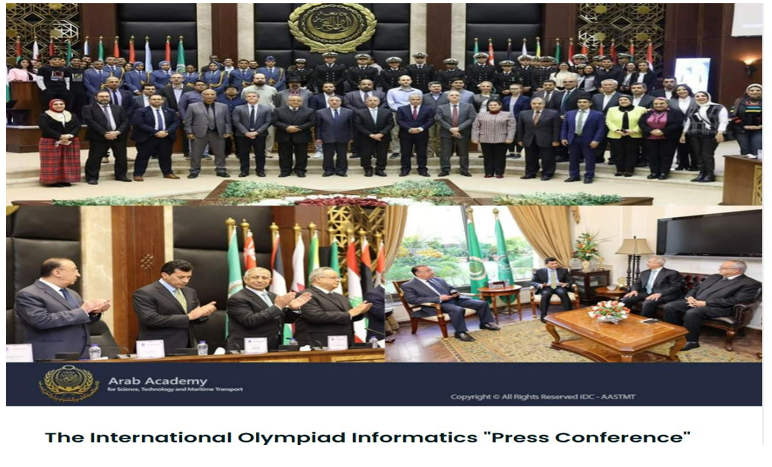
The event’s link on the AASTMT news page:
AASTMT Hosts Press Conference for the 36th International Olympiad in Informatics (IOI 2024) — Empowering Youth and Advancing Decent Work and Economic Growth
Arab Academy for Science, Technology & Maritime Transport (AASTMT) Organizes “Alumni Career Fair 2024” — Advancing Decent Work, Living Wages and Sustainable Employment in Line with SDG 8
Alexandria, Egypt — AASTMT reaffirms its commitment to Sustainable Development Goal 8 (Decent Work and Economic Growth) by organizing the “Alumni Career Fair 2024” on 20 February 2024 at its Abu Qir campus and on 21 February 2024 at its Sheraton campus in Cairo.
aast.edu
The Career Fair connects AASTMT students and alumni with corporate representatives and participating companies — offering a direct channel for job and internship opportunities, helping young professionals and graduates build relationships, gain crucial labour-market access, and receive information about employers and career paths.
aast.edu
Alignment with SDG 8: Employment Practices & Living Wage
By facilitating access to decent employment opportunities and helping graduates transition from education to the labour market, AASTMT supports SDG 8’s target of “productive employment and decent work for all”.
The event emphasises open, inclusive employment practices by inviting a broad cohort of alumni and students — which helps reduce barriers to entry and enables equitable access to work.
Even though the fair does not explicitly mention living wages, by promoting job placements and internships at reputable companies, AASTMT helps ensure graduates are positioned for employment with fair compensation and upward mobility, which is foundational to achieving a living wage and decent standards of living as envisioned in SDG 8.
The Academy’s strong focus on aligning its graduate outcomes with employer needs strengthens institutional capacity to support sustainable economic growth, another pillar of SDG 8.
Institutional Impact
Through this event, AASTMT is building the infrastructure — mentoring, networking and industry linkages — critical to enabling graduates to obtain meaningful employment. By doing so, AASTMT not only contributes to its students’ individual welfare and livelihoods but also to national and regional economic resilience and growth.
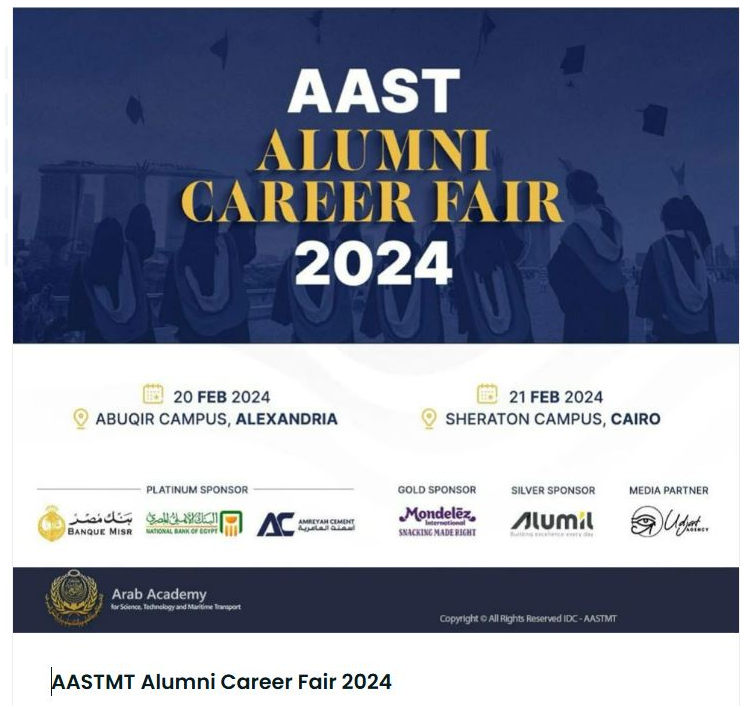
The event’s link on the AASTMT news page:
Arab Academy for Science, Technology & Maritime Transport (AASTMT) Organizes “Alumni Career Fair 2024” — Advancing Decent Work, Living Wages and Sustainable Employment in Line with SDG 8
AASTMT Strengthens Industry Linkages to Advance Decent Work and Economic Growth (SDG 8)
The Arab Academy for Science, Technology and Maritime Transport (AASTMT) reaffirmed its commitment to promoting decent work and sustainable economic growth by conducting a high-level visit to the Kuwait Oil Tanker Company (KOTC) on 22 January 2024.
During the visit, AASTMT President Prof. Ismail Abdel Ghaffar Ismail Farag and the delegation met with senior KOTC executives to discuss updated international maritime training requirements, legislative shifts, and evolving industry frameworks. This partnership-building supports SDG 8 by:
- Enhancing training and professional development aligned with industry needs, thereby increasing the chances of graduates securing meaningful, productive employment.
- Fostering organisational cooperation between academia and industry, which strengthens transition pathways into the labour market, encourages fair and sustainable employment practices, and contributes to industry resilience.
- By equipping students with up-to-date maritime skills and connecting them with a global maritime enterprise, AASTMT helps build a workforce capable of obtaining jobs that are more likely to reflect living wage standards, not just minimum wage positions.
Through such initiatives, AASTMT actively supports the creation of high-quality jobs, equitable employment outcomes, and the growth of a skilled workforce—key targets under SDG 8: Decent Work and Economic Growth.
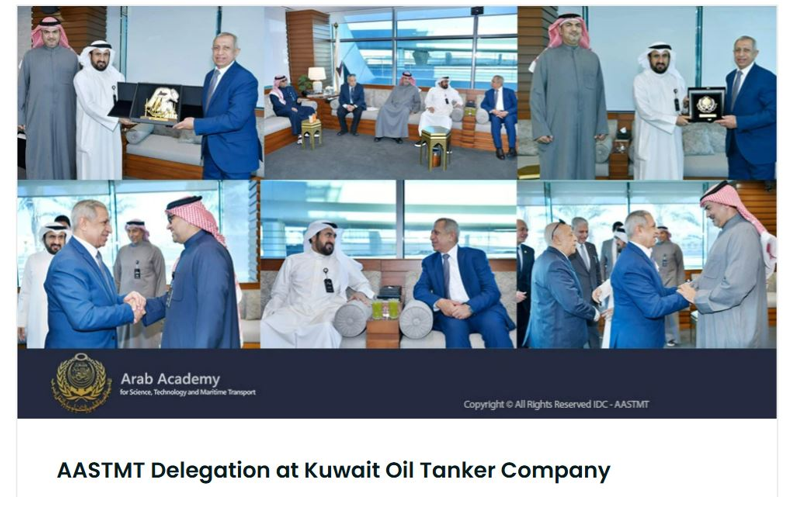
The event link on AASTMT’s news page:
AASTMT Strengthens Industry Linkages to Advance Decent Work and Economic Growth (SDG 8)
AASTMT and Ministry of Endowments Partner to Advance Training, Equal Employment Opportunities, and Fair Pay Practices in Alignment with SDG 8
Alexandria, Egypt – December 2023 — The Arab Academy for Science, Technology and Maritime Transport (AASTMT) has signed a strategic cooperation protocol with the Egyptian Ministry of Endowments (Awqaf) to strengthen collaboration in the areas of training, professional development, and scientific research. The agreement was signed by H.E. Prof. Dr. Ismail Abdel Ghafar Ismail Farag, President of AASTMT, and H.E. Prof. Dr. Mohamed Mokhtar Gomaa, Minister of Religious Endowments.
This partnership aligns closely with the United Nations Sustainable Development Goal 8 (Decent Work and Economic Growth), reflecting AASTMT’s long-standing commitment to promoting equitable employment policies, fair wages, and capacity building across national institutions. By integrating academic expertise with community development, the agreement seeks to ensure that all training and research initiatives contribute to job quality, pay equity, and sustainable growth.
AASTMT’s Pay Scale Equity Employment Policy, rooted in Article 35 of the Egyptian Labor Law, guarantees equal pay for equal work and ensures that all employees receive wages that exceed the local living wage. Through this cooperation, AASTMT will extend these principles into joint training programs and research activities with the Ministry, helping to build institutional systems that value human capital and uphold fairness and transparency in all employment practices.
The collaboration includes the development of specialized training programs, capacity-building initiatives, and joint research projects designed to strengthen professional competencies and improve workplace standards. Both institutions reaffirmed that decent work and fair compensation are essential foundations for social justice, productivity, and national progress.
Prof. Ismail Abdel Ghafar emphasized that “this cooperation not only supports educational and research advancement but also contributes to Egypt’s broader vision for sustainable economic growth through empowering human resources and ensuring wage fairness.”
Through initiatives like this, AASTMT continues to demonstrate its leadership in integrating sustainability and equity into education, employment, and community service — creating lasting impact consistent with the principles of SDG 8.
For more information:AASTMT and Ministry of Endowments Partner to Advance Training, Equal Employment Opportunities, and Fair Pay Practices in Alignment with SDG 8
2022 - 2023
The Arab Academy for Science, Technology, and Maritime Transport demonstrates a strong commitment to Sustainable Development Goal 8, focusing on Decent Work and Economic Growth, through its dedication to offering competitive and fair wages to its employees. Central to its mission is the belief that fair compensation goes beyond financial stability; it is essential for social justice. By paying staff in accordance with their skills and contributions, the Academy cultivates a motivated and thriving workforce while promoting an inclusive and fair work environment aligned with the principles of SDG8. This commitment to fair wages highlights the Academy’s role as a responsible and forward-thinking institution in advancing sustainable development goals.
AASTMT promotes Pay Scale Equity Employment Policy
In line with AASTMT’s alignment with SDG8 (Decent Work and Economic Growth), the AASTMT ensures that it Pay all staff and faculty more than the local living wage. This is a result of AASTMT’s belief that its human resources are one of its main core competencies. For that reason, the AASTMT has developed the Pay Scale Equity Employment Policy, which supports the principle of equal employment opportunity, as defined in Egyptian Labor Law Article 35, and thinks that as part of that Law, all employees should receive equal compensation and treatment.
The Arab Academy for Science, Technology, and Maritime Transport is committed to paying fair salaries and wages to its faculty, staff, and workers, that exceed the minimum wage rate that is determined by the government to provide a living wage that is suitable for a decent life to all its workforce.
Pay Scale Equity Employment Policy
Description
The Arab Academy for Science, Technology, and Maritime Transport supports the principle of equal employment opportunity, as defined in Egyptian Labor Law Article 35, and thinks that as part of that Law, all employees should receive equal compensation and treatment. The Arab Academy for Science, Technology, and Maritime Transport is committed to paying fair salaries and wages to its faculty, staff, and workers, that exceed the minimum wage rate that is determined by the government. The AASTMT is committed to paying fair salaries and wages to its faculty, staff, and workers that exceed the minimum wage rate that is determined by the government.
Scope
This policy applies to all academic and non-academic staff employed by the Arab Academy for Science, Technology, and Maritime Transport including all faculties, divisions, and departments.
Aim
This policy is intended to remove pay discrimination in practice, eliminate systematic bias and discrimination, and ensure that women are compensated equally with males for the work they accomplish.
Policy Statement
The Arab Academy for Science, Technology, and Maritime Transport pays all employees equally and is committed to developing pay scales that are equitable about each employee's qualifications. Individuals shall not be paid differently based on their race, color, religion, sex, national or ethnic origin, age, or status as an individual with a physical or mental disability unrelated to ability, military status, genetic information, marital status, parental status, ancestry, or source of income. This policy includes a commitment to fostering an equal and non-discriminatory work environment. Equal pay should be paid to all employees for work that is the same or roughly similar, for labor that is evaluated as equivalent, and for work of equal value. This policy applies to all kinds of compensation, including salaries, bonuses, social security, vacation and holiday pay, reimbursement for travel expenses, and benefits.
Procedures
To demonstrate our commitment to equal pay, we will:
*Conduct a gender pay review and implement the recommendations in a planned program.
*Disseminate the findings of the gender pay equity review.
* Monitor the impact of our procedures regularly by the University's Diversity and Inclusion policies.
*Educate staff members on how these practices function and how their compensation is determined (on request from a role holder and responding to grievances on equal pay).
*Provide training and direction to managers and supervisory employees involved in salary and benefit decisions.
The above activities are intended to avoid unjustified discrimination and to properly compensate all workers hired by the Arab Academy for Science, Technology, and Maritime Transport for the appropriate knowledge, skills, and competencies. This, in turn, is designed to improve efficiency and strengthen the University's reputation and image as an international institution.
Roles and Responsibilities
The University encourages open communication and will support anyone who raises honest concerns in good faith under this policy.
The Arab Academy for Science, Technology and Maritime Transport staff are responsible for:
• Helping to create a climate at work where communication channels are kept open so that pay concerns are discussed with Human Resources and resolved at an early stage.
• Notifying his/her line manager or Human Resources Director in case of suspicion of pay inequity.
Line Managers and supervisors are responsible for:
• Ensuring that such pay equity is one of the main business policies, respecting human rights with zero tolerance to inequality.
• Compliance with the aforementioned policy and ensuring that his/her team is well aware of it.
• Line managers must report all information concerning possible violations of this policy. The University cannot address violations and take appropriate corrective actions unless it is aware of such issues.
• Responding positively to complaints to avoid them escalating into grievances and taking the appropriate action towards any concern.
• Acting as role models and applying the pay equity policy with fairness and equality.
In the case of underperformers who have issues with their pay, line managers and supervisors have a responsibility to manage underperformance or concerns regarding a staff member’s conduct. During these discussions, managers/supervisors should give constructive feedback to help the staff member understand what he or she has done that needs improvement, address the reasons behind it, and how to improve in the future. This should be done in a constructive, encouraging style, following the University’s Performance Management Policy.
The role of the Human Resources Department is to:
• Ensure the fair implementation and application of this policy and procedure, starting from the hiring process, to applying pay raises and benefits.
• Take a proactive role in ensuring consistency of application across the university.
• Regularly reviewing workplace policies and procedures to ensure the non-existence of the aforementioned issues and the efficiency of workplace practices.
• Ensure that all university staff are adequately oriented or aware of this policy during the onboarding program.
• Provide advice or guidance to related parties through the arising issues or complaints regarding this policy.
Review program
Policy title | Pay scale equity Employment policy |
Date created | November 2020 |
Date reviewed | November 2023 |
Approving body | Human Resources Affairs Department |
Version | 2 |
Next review date | November 2025 |
Policy owner | Human Resources Affairs Department |
Lead contact | Head of Human Resources Affairs Department |
Approval Signature | Dr. Yasser Gaber Dean of Scientific Research and Innovation |
Please read our Pay Scale Equity Employment Policy
Also, the AASTMT has conducted several workshops to raise the awareness of its staff,
faculty and other stakeholders with the importance of commitment to a decent workplace as well as payment of fair salaries and wages.
The college of Maritime Transport at the AASTMT organizes a workshop in collaboration with its Advisory board to promote decent employment practices in the Maritime Sector
On November 30, 2022, the College of Maritime Transport at the Arab Academy for Science, Technology, and Maritime Transport (AASTMT) organized a workshop in collaboration with its Advisory Board to promote fair and decent employment practices within the maritime sector. This workshop underscored the importance of improving work conditions in alignment with United Nations Sustainable Development Goal (SDG) 8, which aims to foster inclusive and sustainable economic growth, employment, and decent work for all. Given the maritime sector's vital role in the global economy, this initiative brought together key stakeholders to address industry challenges around job quality, skills development, and safe working conditions, focusing on creating a more supportive environment for maritime professionals.
A key emphasis of the workshop was on pay scale equity and the establishment of a living wage, encouraging employers to adopt fairer pay structures. Addressing these issues is critical for reducing wage disparities and ensuring that maritime workers are compensated fairly for their skills and contributions. Pay scale equity and a living wage are not only fundamental to individual well-being but also support SDG 8’s objectives by fostering sustainable economic growth and reducing inequality within the industry. Through this event, AASTMT highlighted the value of decent employment practices, demonstrating a commitment to creating a more resilient and equitable maritime sector that benefits both workers and employers.

President of the Cairo syndicate of commerce visits AASTMT and discusses decent employment practices with the AASTMT president
On November 17, 2022, the President of the Arab Academy for Science, Technology, and Maritime Transport (AASTMT) met with the President of the Cairo Syndicate of Commerce to strengthen collaborative efforts in promoting fair and sustainable employment practices. This meeting underscored a shared commitment to advancing decent work standards and aligning with the United Nations Sustainable Development Goal (SDG) 8, which advocates for inclusive economic growth, productive employment, and decent work for all. By combining AASTMT’s educational expertise with the Syndicate’s role in commerce, the leaders explored ways to enhance job quality, improve pay equity, and encourage fair labor practices across sectors, with a focus on ensuring workers receive adequate support and compensation.
A central theme of the meeting was the importance of pay scale equity and the implementation of a living wage to address wage disparities. Both presidents emphasized that fair compensation is fundamental to a stable and motivated workforce, and committed to advocating for policies that ensure workers are paid in accordance with their skills and roles. These discussions highlighted the significance of equitable pay as a way to reduce inequalities and improve employee satisfaction, aligning with SDG 8’s focus on fostering decent employment conditions. Through these collaborative efforts, AASTMT and the Cairo Syndicate of Commerce aim to set a positive example for other organizations, showcasing the value of fair employment practices in building a more sustainable and resilient economy.
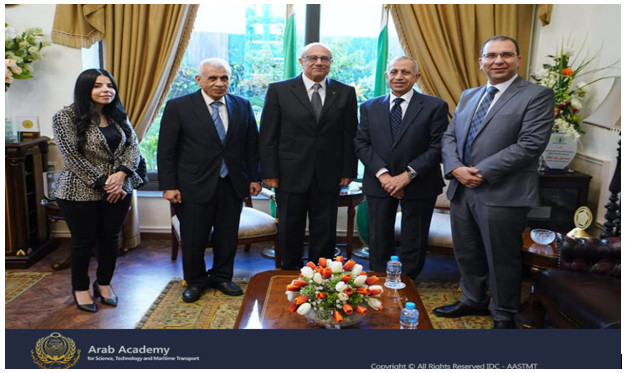
The AASTMT encourages decent employment practices in the ICT sectors through launching Green Technology Initiative
On November 15, 2022, the Arab Academy for Science, Technology, and Maritime Transport (AASTMT) launched a green technology initiative on its campus, reflecting a commitment to sustainable development and environmental responsibility. This initiative aligns with the United Nations Sustainable Development Goals, particularly SDG 8, which supports sustainable economic growth and decent work through innovation and environmentally friendly practices. By integrating green technology into its campus operations, AASTMT is setting a powerful example of how educational institutions can contribute to a cleaner, more resilient future. The project also aims to enhance the skills of students and staff by familiarizing them with sustainable technologies and practices, preparing them for careers in an increasingly eco-conscious economy.
Central to this initiative is the promotion of green jobs and the creation of a work environment that supports fair employment and skill development in emerging fields. Through this project, AASTMT encourages sustainable employment practices by offering training in renewable energy, waste management, and resource conservation, thereby expanding job opportunities in the green sector. Additionally, by prioritizing fair pay and decent working conditions in these new green roles, AASTMT aligns with SDG 8’s objectives to promote productive employment and economic inclusivity. The green technology initiative not only contributes to environmental sustainability but also supports economic resilience and equity, preparing the AASTMT community to lead in both sustainable innovation and responsible employment practices.
Read more about this event on AASTMT’s news page

AASTMT HUAWEI EMPLOYMENT DAY AT AASTMT campus
On November 7, 2022, the Arab Academy for Science, Technology, and Maritime Transport (AASTMT) hosted Huawei Employment Day on its campus, an event designed to connect students with potential job opportunities and promote fair employment practices in the tech industry. This collaboration with Huawei provided AASTMT students a unique opportunity to learn about career pathways, technological advancements, and skills required in the digital economy. The event aligned closely with the United Nations Sustainable Development Goal (SDG) 8, which focuses on promoting inclusive and sustainable economic growth, productive employment, and decent work for all. By facilitating direct access to employers and providing insights into equitable job practices, the event highlighted AASTMT’s commitment to preparing students for the future of work in a fair and inclusive manner.
A focal point of Huawei Employment Day was the importance of equitable pay and decent work standards in the tech industry, which is essential for fostering a motivated, skilled workforce. Representatives from Huawei emphasized the company’s commitment to fair pay scales, inclusive employment practices, and the provision of a living wage, reinforcing the values central to SDG 8. Through workshops and networking sessions, students were encouraged to pursue tech careers that not only offer competitive compensation but also uphold ethical employment standards. This initiative supported AASTMT’s goal of creating a campus culture that values sustainable employment practices, ensuring that graduates are equipped with both the technical skills and the awareness to contribute to a more equitable and responsible workforce.
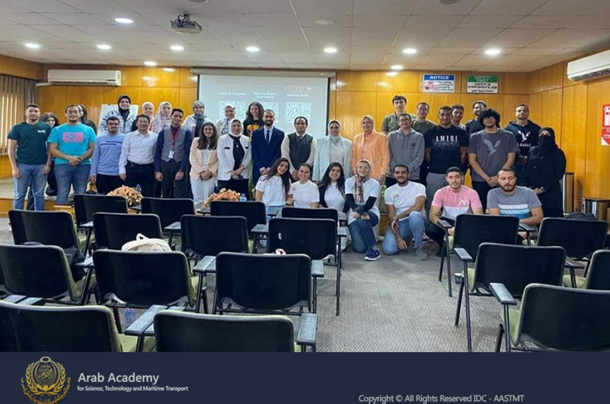
↵
2021 -2022
The Arab Academy for Science, Technology, and Maritime Transport exemplifies its unwavering commitment to Sustainable Development Goal 8, Decent Work and Economic Growth, through its steadfast dedication to providing competitive and fair wages to its employees. At the heart of its mission lies a strong belief that fair compensation is not just a measure of financial prosperity but also a cornerstone for social justice. By remunerating its staff members at a level that reflects their skills and contributions, the Academy not only nurtures a thriving and motivated workforce but also fosters an inclusive and equitable work environment where the principles of SDG8 are firmly upheld. This commitment to providing good wages is a testament to the Academy's role as a responsible and progressive institution in the pursuit of sustainable development goals.
AASTMT promotes decent employment practices
In line with AASTMT’s alignment with SDG8 (Decent Work and Economic Growth), the AASTMT ensures that it Pay all staff and faculty more than the local living wage. This is a result of AASTMT’s belief that its human resources are one of its main core competencies. For that reason, the AASTMT has developed the Pay Scale Equity Employment Policy, which supports the principle of equal employment opportunity, as defined in Egyptian Labor Law Article 35, and thinks that as part of that Law, all employees should receive equal compensation and treatment. The Arab Academy for Science, Technology, and Maritime Transport is committed to paying fair salaries and wages to its faculty, staff, and workers, that exceed the minimum wage rate that is determined by the government. Please read our Pay Scale Equity Employment Policy Also, the AASTMT has conducted several workshops to raise the awareness of its staff, faculty and other stakeholders with the importance of commitment to a decent workplace as well as payment of fair salaries and wages.
The AASTMT celebrates the International Day for Women in Maritime 2022
In celebration of the International Day for Women in Maritime 2022, the Arab Academy for Science, Technology, and Maritime Transport (AASTMT) hosted a dynamic event on the 18th of May 2022 that not only honored the achievements of women in the maritime industry but also focused on advancing Sustainable Development Goal 8 (SDG8). This special occasion featured a series of enlightening workshops and awareness sessions, with a particular emphasis on promoting decent employment practices, including the vital concept of a living wage. AASTMT recognized that championing gender equality and decent work go hand in hand, and thus, these sessions underscored the importance of ensuring that all staff and faculty members receive at least a living wage, which aligns with local economic conditions and social justice principles Read more...

The event’s link on the AASTMT news page:
The AASTMT celebrates the International Day for Women in Maritime 2022
The AASTMT participates in the inauguration of the interactive conference for Technology and Persons with Disabilities
In pursuit of its commitment to advancing fair wages as an integral part of Sustainable Development Goal 8 (SDG 8), the Arab Academy for Science, Technology, and Maritime Transport (AASTMT) is dedicated to safeguarding its accomplishments and global standing. To remain responsive to contemporary developments and to promote excellence while addressing the imperative of equitable compensation, H.E. Prof. Dr. Ismail Abdel Ghafar Ismail Farag, the President of AASTMT, actively engaged in the interactive conference for Technology and Persons with Disabilities and the Exhibition of the Inventions and Technological Innovations for Persons with Disabilities in the Arab Region Read more...

The event link on AASTMT’s news page:
The AASTMT organizes a workshop for its managers to promote decent employment practices and payment of fair wages
The Arab Academy for Science, Technology, and Maritime Transport (AASTMT) conducted a highly impactful workshop for its managers on the 18th of July 2022, centered around the promotion of decent employment practices, with a particular focus on the concept of a living wage. The event served as a critical platform for AASTMT's leadership to engage in thoughtful discussions and strategize ways to ensure that all staff and faculty members are compensated at least the living wage, which is defined as the local living wage when government guidelines are available, or as the local financial poverty indicator for a family of four, expressed as an hourly wage. This workshop underlined AASTMT's unwavering commitment to Sustainable Development Goal 8 (SDG8), emphasizing decent work and economic growth, by prioritizing fair and equitable remuneration for its employees Read more...



